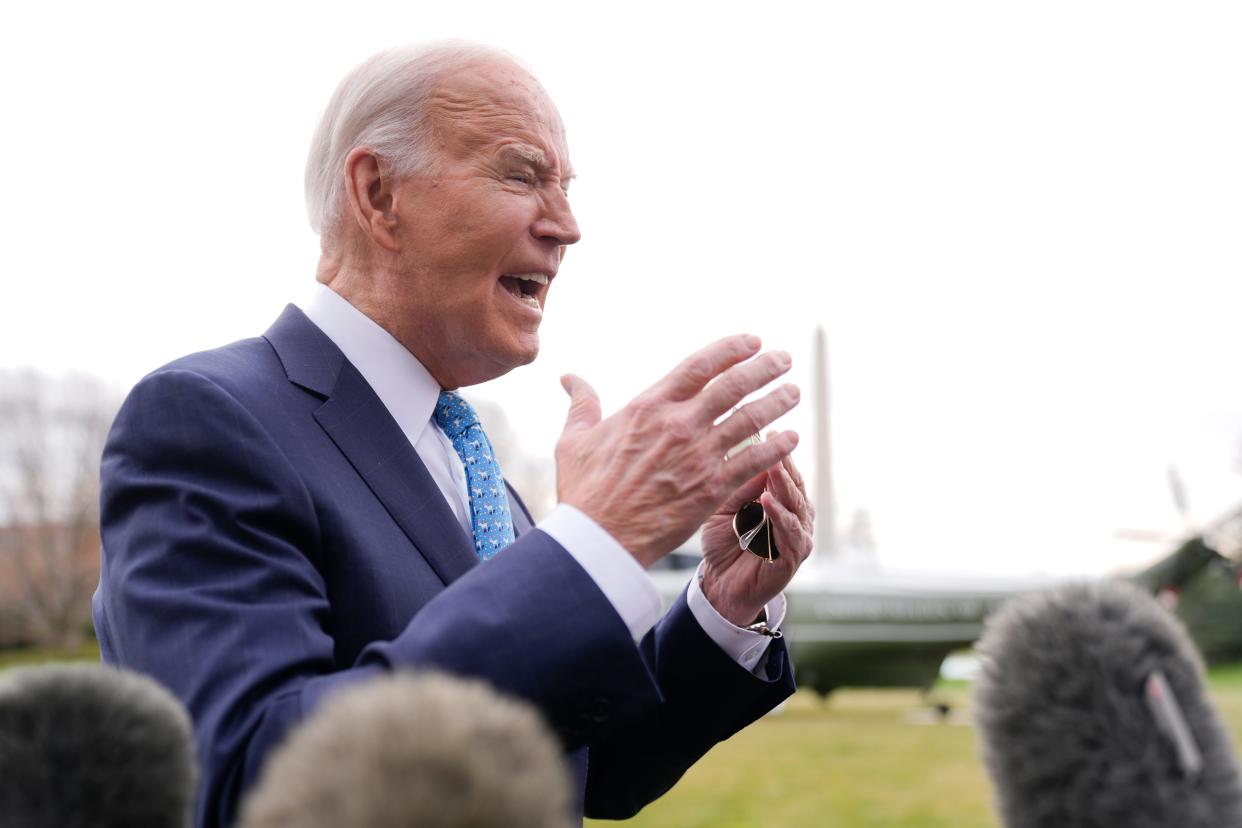Biden's pivot: Why the president is moving to the right in 2024 on immigration

- Oops!Something went wrong.Please try again later.
WASHINGTON − Two years into his presidency, Donald Trump warned that he would "close the southern border entirely" if Democrats kept blocking funding for his proposed border wall.
It was the type of Trump rhetoric about the U.S.-Mexico border that Democrats regularly scorned as xenophobic.
But now, President Joe Biden is using similar language − seeking a border shutdown − as he urges Congress to pass a bipartisan bill under negotiation by senators to address what Biden has started to call "the border crisis."
Biden said the proposal would be the "toughest and fairest" set of border reforms in U.S. history and includes new presidential authority to "shut down the border when it becomes overwhelmed."
“If that bill were the law today, I’d shut down the border right now and fix it quickly," Biden said Saturday to Democrats in Columbia, South Carolina.
Biden's push for a bipartisan border bill − one that also would include funding for Ukraine and Israel − marks a seismic shift to the right on border and immigration politics that has built over the past year.
Ahead of the 2024 presidential election, Biden is trying to strip Republicans of one of their most effective wedge issues, setting up a potential case that House Republicans − who have refused to back a bipartisan border bill − stood in the way of long-discussed action on the border.
Yet the discussions are a far cry from a comprehensive immigration bill Biden sent to Congress on his first day of office that sought to "restore humanity and American values to our immigration system" by offering pathways for citizenship to undocumented immigrants in the U.S.
"The discourse has become which of the parties can be harsher on border enforcement," said Denise Gilman, co-director of the Immigration Clinic at the University of Texas, Austin, School of Law.
Gilman said the political posturing ignores the reality that the border has never been the subject of policies more stringent regarding screenings for entry, expedited removal of migrants and other areas.
"I have to think it's mostly because the Republicans have succeeded in creating a lot of fear around migration issues and have had success in doing that," Gilman said.

From the border: As battle brews between Texas and U.S., tiny Eagle Pass braces for its next conflict
The 2024 election calculus for Biden, Trump
For years, Republicans have rallied their conservative base and tried to appeal to independent voters by accusing the left of being soft on border enforcement.
Republicans are historically viewed more favorably on border security. A USA TODAY/Suffolk University Poll in October found more Americans, by a 50%-41% margin, trust Trump − the front-runner for the Republican nomination − to handle immigration over Biden.
Biden's tone has changed after record daily border crossings over the past year. The president has also heard from Democratic mayors who have raised concerns about needing additional resources to handle the influx of migrants in their cities.
"No, it's not," Biden said this month when a reporter asked him whether the border is secure. "I haven't believed that for the last 10 years, and I've said it for the last 10 years."
Republicans have taken cues from Texas Gov. Greg Abbott, whose hard-line tactics at the border – including installing razor wire along the Rio Grande – appear to be influencing the tenor of the national immigration debate.
Meanwhile, House Republicans are ratcheting up the border feud further by moving to impeach Homeland Security Secretary Alejandro Mayorkas, arguing he has refused to enforce the nation's immigration laws.
Although the text of bipartisan border legislation isn't finalized, senators have discussed giving the Department of Homeland Security power to shut the border down to migrants crossing illegally when daily crossings exceed a daily average of 4,000 over a one-week period.
And if migrant border encounters surpass an average of 5,000 a day − a threshold now met − DHS would be required to close the border to migrants seeking to cross without prior authorization between ports of entry. Under the proposal, certain migrants would be allowed to remain in the U.S. if they are fleeing torture or persecution in their countries.
"This is exactly what they've been asking for − literally what Republicans have been asking for. And now here it is. It's coming to fruition," White House press secretary Karine Jean-Pierre said Monday. "So, they should get on board."
Another area discussed by senator negotiators is speeding up the asylum process so that immigration judges hear within six months cases that can now take years.
Making the passage of any deal in Congress highly unlikely, however, Trump has told Republicans to oppose the package. The demise of a bipartisan border deal would deny Biden the chance to claim a victory in addressing surging migration at the southern border.
"We're now fully into electioneering and to partisan politics," said Doris Meissner, director of the U.S. Immigration Policy Program at the Migration Policy Institute, a nonpartisan thinktank. She called Biden's positioning "a direct response to the fact that the former president is saying 'Don't solve the problem at the border.' Biden is saying 'Give me the tools and I will solve the problem.'"
A very different immigration debate from a decade ago
A decade ago, in 2013, the national immigration debate during the Obama presidency still hinged on bipartisan efforts to contend with the millions of undocumented immigrants living in the U.S., including providing them a path to citizenship. The so-called Gang of Eight U.S. senators – four Democrat and four Republican – wrote bipartisan legislation to that effect, but it died on the House floor.
No similar effort has gained momentum in Congress since.
"I think President Biden's response is fitting in that I think everyone agrees that what's happening at the border is a symptom of a broken system," said Jennie Murray, president of the National Immigration Forum, which works to build a moderate coalition for immigration reform. "But that's only one of the solutions," she said, arguing more resources for border officers are needed as well an overhaul of the visa system.
The White House has rejected comparisons that opponents from the left make between Trump's and Biden's immigration policies, arguing Trump forced the separation of migrant families at the border, among other cruel actions.
Trump has called for a mass deportation of undocumented immigrants. Trump, also unlike Biden, routinely uses anti-immigrant rhetoric, warning his supporters last year that illegal immigrants are "poisoning the blood" of the country, echoing rhetoric used by Adolf Hitler.
Biden has taken more executive actions on immigration in the first three years of his administration than Trump took in all four years of his presidency: 535 immigration orders compared with Trump’s 472, according to a new analysis by the Migration Policy Institute.
But Biden's frenetic pace of action hasn’t stopped critics from accusing him of inaction.
The Biden years have been marred at the border by the aftereffects of the COVID-19 pandemic, which caused widespread economic strife and kept people from traveling across borders. Once the worst of it waned, pent-up demand for economic opportunity and family reunification exploded, as did the need for many to flee political upheaval in places like Venezuela. New records were set for daily migrant encounters at the border, which in December topped 10,000 in a 24-hour period.
Border agencies registered a record 6.3 million migrant encounters at the border since Biden took office, according to a Migration Policy Institute analysis of Office of Homeland Security Statistics. As many as 2.4 million migrants were allowed into the country, including through pathways like CBP One or humanitarian parole.

Johnson, who has said he speaks to Trump regularly about border talks, has argued Biden can already take executive action without action from Congress − a position the White House notes is counter to Johnson's previous stated position.
If Republicans don't get behind a border deal, Biden will be handed a new argument for the campaign trail: that he tried to "shut down the border" but was blocked by his opponents.
On the other hand, Biden risks alienating himself among immigrant advocates and other progressives who make up the left flank of the party.
Dylan Corbett, executive director of the El Paso, Texas-based Hope Border Institute, said actions taken to date by the administration have left border communities “in a better position than before to manage migration at the border.”
“They attempted to pivot toward root causes; they implemented innovative family reunification programs; their support to NGOs at the border and in the interior have been key to managing increased arrivals,” Corbett said after a meeting Monday with Mayorkas in Washington.
"That said," Corbett added, "the reversal by the president is devastating. What they are proposing isn’t going to work.”
Reach Joey Garrison on X, formerly known as Twitter, @joeygarrison.
This article originally appeared on USA TODAY: Biden and the border: A seismic shift to the right on immigration

